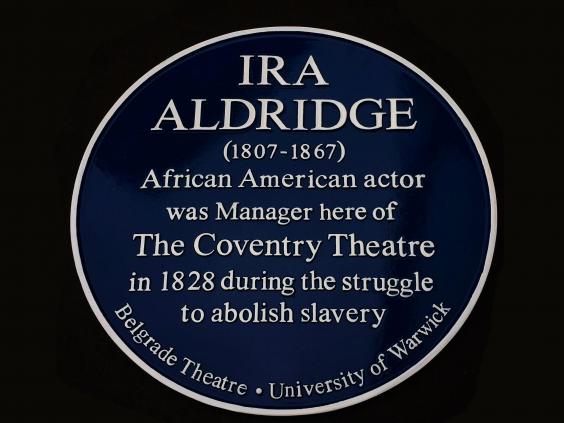On this day in 1867, Ira Aldridge, the first black Shakespearean actor in Britain, passed away in Poland.
Today, on the 150th anniversary of his death, he is remembered for paving the way for black theater actors in principal roles.
Last week, the city of Coventry and Lord Mayor Tony Skipper unveiled a blue plaque in commemoration of Aldridge's legacy according to The Independent.

“It’s very important,” Professor Tony Howard, who leads Warwick University’s Multicultural Shakespeare project, said. “He’s been admired and respected for a long time as the first black Shakespearean actor, but many people are less aware of the fact that he had also been the first black theater manager.”
As a tribute, Atlas Obscura chronicled the career of the African American stage star who was celebrated during his lifetime as one of the greatest actors of his time.
Born free, Aldridge was inspired to become an actor after attending a Shakespeare play at a black theater, the African Grove Theater, in New York.
He worked hard on his craft, aspiring to one day act at the Grove.
He got his wish, although not long after his debut on the stage, the theater “mysteriously burned to the ground” according to black theater experts James Hatch and Ted Shine.
With no other black theaters around for him to act in, the New York native traveled to the U.K. in 1824 at the age of seventeen.
Once there, he studied at the University of Glasgow, where he won awards for his skill in Latin. After finishing his education, he headed to London to make it on the stage.
In 1825, just 18 months after arriving in the U.K., Aldridge won the role of Oroonoko in The Revolt of Surinam.
Sadly, the reviews were less than kind. Despite the fact that Oroonoko is a black man, many of the reviews argued that the stage was no place for black people.
Discouraged, Aldridge left London, traveling through small U.K. towns, playing black characters like Oroonoko and Othello. As he honed his craft, the thespian found an increasingly warm reception at each town he visited.
In Ira Aldridge: The African Roscius, scholar Bernth Lindfors writes that these seven years spent wandering is one reason why Aldridge isn't better known. “As a luminary, he was more a comet than a fixed star — here today, gone tomorrow — and as a consequence, he shines less brightly now.”
Still, the countryside tour opened up an opportunity to play Othello in Vienna. Aldridge jumped on it, and the day after the show opened, a paper printed the following: "[Aldridge is] an eminent artist, enrapturing as well by the simpleness and truthfulness of his performance in general, as by the power with which he marked the most violent eruptions of passion."

This obviously was a major milestone for an African American as at this time. In the United States, slavery was still a daily reality, and the Civil War had yet to begin.
And Aldridge knew it. Although he made his living making audiences laugh and cry with his riveting performances, he did not remain quiet when it came to the subject of slavery.
At the time, it was customary for Shakespearean plays to end with what was called a "jig," a ballad set to music.
For his jigs, Aldridge would play the guitar and recite poems that he wrote, like this one:
I risk my all upon thy power
Life, son, yea, country, too
To free my brethren, fetter’d slaves
From sinking in inglorious graves.
Audiences were often highly receptive to his words. In Coventry, the site of the new plaque, it is reported that “when he left, people inspired by his speeches went to the county hall and petitioned for [slavery's] abolition.”
In addition to his protests, Aldridge even donated much of his earnings to the abolitionist movement and the Negro State Convention.
As time went on, Aldridge was able to tackle roles written for whites. He toured Europe playing Romeo, Hamlet, King Lear, Shylock and others, sometimes in white make-up.

Aldridge played the in countless roles for decades as Aaron in Titus Andronicus, Romeo, Hamlet, King Lear, Shylock, and Othello.
According to historian George Freeman Bragg, when Aldridge portrayed Iago in Moscow, “a number of students who had witnessed the performance unhitched the horses from the actor’s carriage, after the play, and dragged him in triumph to his lodgings," they loved his performance so much. Bragg added that "in Sweden and Germany and England, his name was a household word."
Ira Aldridge was a household name in royal households, too. Invited to perform by various royals, Aldridge found himself a palace favorite across the continent. He received medals and commendations from many kings and queens, and even married a Swedish royal, Countess Amanda von Brandt.
Still, despite all the acclaim, Europe's white audiences did not forget that Aldridge was black. Nor was there another actor like him.
When he died at the age of 60, one of his obituaries read, "He is the only actor of color that ever was known, and probably the only instance that may ever again occur.” The tributes in other papers were much the same.
Thankfully, they were wrong. However, with matters like the #OscarsSoWhite controversy, it is clear that when it comes to people of color on the stage and screen, there is still room for improvement.
It is thanks to trailblazers like Ira Aldridge, however, that we are where we are today, and it is certain that his legacy will live on.

